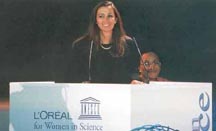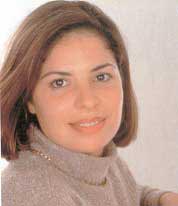UNESCO–L’Oreal Awards
As in many fields of expertise worldwide, female scientists receive less support and opportunities than their male colleagues as they struggle to make their mark in what is still seen by many as a male profession.
Even in countries like France, USA, Russia and the United Kingdom, the promotion of female researchers is much slower than among men. Women work behind the scenes with little resources. To obtain funds, they have to be high profile. And in order to obtain this kind of notoriety they have to publish, travel and thus they needs the means to do so. This is why the L’Oreal–UNESCO award was created.
The award allows female researchers to publish their research works, play a more influential role within the scientific community and encourage future generations to embark on a scientific career.
It was a logical step then that UNESCO (United Nations Educational Science and Cultural Organisation) support the initiative as the organisation has always wanted to use and encourage the potential of women, their experience, talent and knowledge for the benefit of the community.
Since it was founded in 1907, the L’Oreal Group has accorded top priority to research – transforming cosmetology into a fully-fledged scientific discipline.
“L’Oreal’s commitment alongside UNESCO in the For Women In Science partnership is a concrete expression of our firm conviction that science is the source of all progress and that the contribution of women is vital to its future.”
In 1999 UNESCO and cosmetics giants L’Oreal formed a partnership to create an awards programme which aims to encourage, support and recognise the contribution of women in science all over the world. Launched in 1999 the unique programme was entitled For Women in Science.
The programme launched two simultaneous awards categories: The L’Oreal-Helena Rubinstein awards, which reward experienced women scientists pursuing a career in research and the UNESCO-L’Oreal Fellowships, which encourage young women scientists to a pursue a career in research.
During 1999, the Unesco committee appointed 400 sponsors from the international scientific community to put forward possible female science candidates for the former award, The L’Oreal-Helena Rubinstein Award. Nearly 100 files were presented to the jury, of which 32 were shortlisted for prize winning (including Professor Islam) and in October 1999 the jury finally selected five winners (one from each continent). A prize of US$20,000 was awarded to each of the five selected laureates.
In addition to this the jury also awarded US$10,000 fellowships to 10 young graduates – two from each continent – with the aim of supporting young women scientists pursue careers in research.
Arab Women Honoured
Early this year, the long process of appraising and selecting candidates culminated in a prestigious Awards Ceremony the UNESCO Headquarters in Paris on January 10th. Awards were presented by Nobel Prize Winner for Medicine 1974, Professor Christian De Duve, plus 14 other eminent members of the scientific community.
This exciting event was marked by an important contribution from Arabic women scientists – four of the 15 women honoured were from the Arab world. Professor Samira Ibrahim Islam of Saudi Arabia was among 32 winners of the L’Oreal-Helena Rubinstein Awards 2000. Professor Joanne Khoury a Lebanese American citizen was one of just five laureates of the L’Oreal-Helena Rubinstein Awards. While two young graduates from the Middle East, Sonia Nasr of Lebanon and Dorsaf Essebai from Tunisia, were among the Fellowship holders for the year 2000.
Fellowship Winners

Sonia Nasr is a Phd in Biological Sciences who conducted a thesis on satellite heterochromatin at Purdue University in the USA and who is currently working at the American University of Beirut. She will use the grant to return to Purdue University to study gene regulation during growth. Once back in Beirut, she will set up her own research department on the causes of
infertility in women of childbearing age.

 `
`